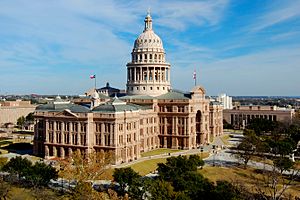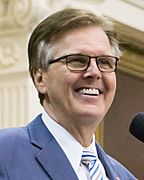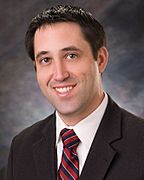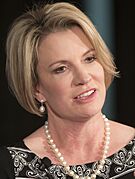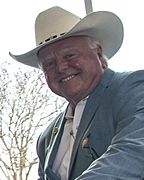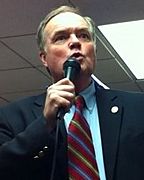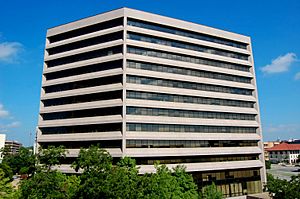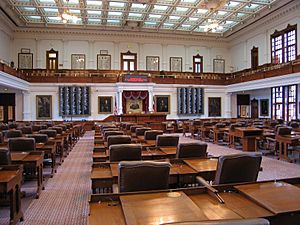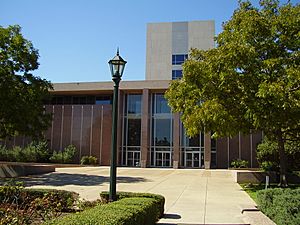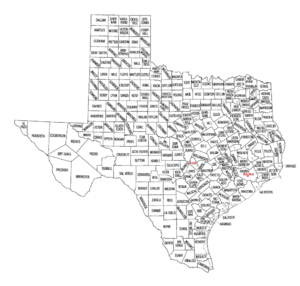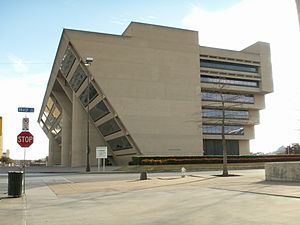Government of Texas facts for kids
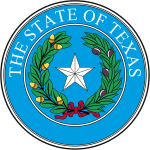
|
|
| Part of | United States of America |
|---|---|
| Constitution | Constitution of Texas |
| Legislative branch | |
| Name | Legislature |
| Type | Bicameral |
| Meeting place | Texas State Capitol |
| Upper house | |
| Name | Senate |
| Presiding officer | Dan Patrick, President |
| Lower house | |
| Name | House of Representatives |
| Presiding officer | Dade Phelan, Speaker |
| Executive branch | |
| Head of State and Government | |
| Title | Governor |
| Currently | Greg Abbott |
| Appointer | Election |
| Cabinet | |
| Leader | Governor |
| Deputy leader | Lieutenant Governor |
| Headquarters | Texas State Capitol |
| Judicial branch | |
| Name | Judiciary of Texas |
| Courts | Courts of Texas |
| Supreme Court of Texas | |
| Chief judge | Nathan Hecht |
| Seat | Austin |
The government of Texas works under the rules of the Constitution of Texas. It is a democratic state government. It uses a system where the president (or governor, in this case) leads the executive branch. Texas also has governments at the county and city levels.
Austin is the capital city of Texas. The State Capitol building looks a lot like the United States Capitol in Washington, D.C.. However, it is made of Texas pink granite. A statue of the "Goddess of Liberty" stands on top, holding a five-point Texas star. The capitol was even built seven feet taller than the U.S. national capitol on purpose!
Texas Government: The Executive Branch
The executive branch of Texas government carries out the laws. It includes several important officials who are elected by the people of Texas.
-
Greg Abbott (R)
Governor
Texas has a "plural executive" system. This means the Governor shares power with other elected officials. Most executive officers are elected independently. This makes them directly responsible to the public, not just the Governor. The Secretary of State is the only executive officer appointed by the Governor.
The Governor's powers are somewhat limited compared to governors in other states. The Lieutenant Governor, who leads the Senate, often has a lot of influence. The Governor does command the state's military force. They can also reject bills passed by the Legislature. The Governor can call special meetings of the Legislature whenever needed. They also appoint members to various state boards and fill judge openings.
State Agencies and Their Roles
The executive branch also includes many boards and commissions. Some members are elected, and others are appointed by the Governor. These groups help manage different parts of the state. Most state agencies have their main offices in Austin.
The Texas Administrative Code contains all the rules for Texas state agencies. It is published every year. The Texas Register is published weekly. It shares new rules, notices, and other important information for the public.
Texas Government: The Legislature
The Texas Legislature is the part of government that makes laws. It has two parts, which is called bicameral.
The Texas House of Representatives has 150 members. The Texas Senate has 31 members. The Speaker of the House leads the House. The Lieutenant Governor leads the Senate. This branch is very powerful because it controls the state's money. It also has strong ties to the Lieutenant Governor.
The Legislature meets for regular sessions every two years. These sessions start in January of odd-numbered years. A regular session can last for a maximum of 140 days. The Governor can call special sessions at other times. These special sessions are for important laws. They can only last 30 days. During special sessions, the Legislature can only pass laws on topics the Governor has chosen. Only the Governor can call these special sessions.
Texas Government: The Judiciary
The judicial system in Texas is known for being very complex. It has many different courts and levels.
Texas has two highest courts:
- The Texas Supreme Court handles civil cases (disputes between people or groups).
- The Texas Court of Criminal Appeals handles criminal cases.
Most judges at all levels are chosen through elections. If a judge's spot becomes empty between elections, the Governor appoints someone. All members of the Texas Supreme Court and the Texas Court of Criminal Appeals are elected by voters across the state.
Municipal Courts are the busiest courts. County and District Courts handle most other cases. These courts often share buildings. The Supreme Court is in charge of the system. It gets help from the Texas Office of Court Administration and the State Bar of Texas.
Texas Government: Local Government
Texas has different levels of local government. These include counties, cities, and special districts.
County Government in Texas
Texas has 254 counties, which is more than any other state. Each county is managed by a five-member Commissioners' Court. This court has four commissioners elected from different areas. It also has a county judge elected by everyone in the county. The county judge votes with the commissioners.
Other officials, like the sheriff and tax collector, are also elected. The Commissioners' Court decides their office budgets. Counties in Texas have limited power to make their own rules. They cannot create zoning laws in most cases. However, counties can collect property taxes. They use this money to provide services to residents.
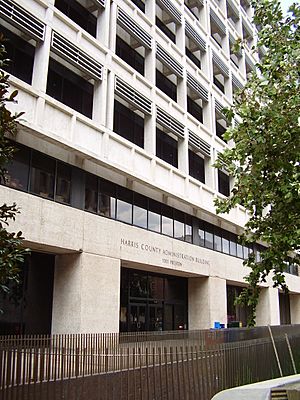
Unlike some other states, Texas does not allow cities and counties to combine their governments. However, cities and counties can work together. They can share services, like collecting property taxes for each other.
City Government in Texas
Areas within a county are either part of a city or not. If an area is part of a city, it is called "incorporated." If it is not part of a city, it is "unincorporated." In unincorporated areas, the county handles law enforcement and road maintenance. Cities have their own local rules and police regulations.
Cities are either "general law" or "home rule" cities. A city can become "home rule" if it has more than 5,000 people. Voters must also agree to it. Home rule cities can write their own city rules. General law cities have much more limited powers.
City elections in Texas are "nonpartisan." This means candidates do not run as members of a political party on the ballot. However, people usually know which party a candidate belongs to.
Special Districts in Texas
Besides cities and counties, Texas has many special districts. These districts handle specific services. Their leaders are usually elected without party labels or are appointed.
The most common type is the independent school district. These districts have their own board of trustees. This board is separate from other government groups. School district boundaries often do not match city or county lines. One school district might cover several counties. A large city might have several school districts. The Texas Education Agency oversees public education in Texas.
Other special districts include groups that manage groundwater, river authorities, and water supply. There are also districts for public hospitals, roads, and community colleges.
See also
- Politics of Texas
- Elections in Texas
- Law of Texas
- United States congressional delegations from Texas
- Women in Texas government


